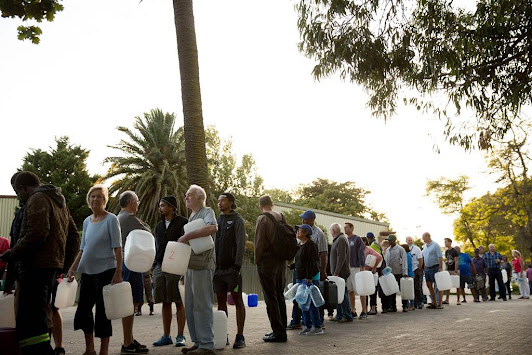 |
| 2021 Circle of Blue – |
Most of this blog focuses on international political relations around water between different African countries and different parts of the world with Africa. I would like here to look at a more local scale : the nation. So I’m gonna see how water is linked to a country’s government by looking at South Africa’s meters of prepaid water to see the relationship between water, democracy, and the forms of government.
Access to water is culturally important in most societies where government should provide the minimum amount required to survive ( Muller, 2007). Besides, how water is managed is ‘an important indicator of success’. As the article says : « water is both the subject of and a metaphor for political discourse ».
In 1994, after independence, 1/3 of South Africans did not have access to safe and practical water, which put water immediately on the agenda of the new democratic government. This is how a national programme was launched by the Department of Water Affairs and Forestry (DWAF), which had by 2006 provided access to water-supply infrastructure to over 10 million people.
 |
| South Africa’s water stress index relative to global scores. World Wide Fund Water Risk Filter |
That led to te creation of the Water Services Act and the National Water Act based on the principles of ‘an active and informed citizenry, actively participating in the management of South Africa’s scarce water resources’ ( Schreiner, 2004).
This need created the idea that : ’politics of water supply and sanitation can rarely be isolated from the issues of public management’ ( Schreiner, 2004). These projects coincide with the emergence of local government everywhere in
South Africa to promote democracy.
These political manoeuvres were the product of the decentralisation adopted in the South African Constitution with the idea that : ‘water services cannot be understood outside the discourse of decentralisation’. (Muller, 2007). This is an idea of Amartya Sen who believe that democratic participation is key to development.
There was born the project of the introduction of a policy of ‘free basic water’, in the terms of which every household should receive 6,000 litres of water per month free and ‘any use above this should be paid for’. ( Muller, 2007). This global privatisation campaign come from a pressure from France and Britain with the idea that it led to democracy (Schnitzler, 2008).
 |
| Prepaid meter installation |
But not everybody agreed with that : In 2004, hundreds of protesters against the increasing installation of prepaid meters in townships around Johannesburg. More specifically, the demonstration targeted Operation Gcin’amanzi (Zulu for ‘Save Water’), a controversial project to install prepaid water meters in all Soweto households (Schnitzler, 2008).
Residents questioned the legality of pre-paid water meters cause their installation was racially discriminatory cause the government only used the meters in historically black townships. There were also concern for health with potential water disconnection. (Kemerink et al, 2011).
Therefore, we could see on street graffiti-mural explaining how to use ‘wisely’ the water.
 |
| Bulawayo prepaid water march |
Two different problems – apartheid-era infrastructure and the non-payment of accounts – were here gathered in one generic problem to an equally quest to ‘save water’ ( Muller, 2007).
‘Water infrastructure, in particular, was seen as vital not only to public health, but also to the creation of an environment conducive to moral behaviour’. Those infrastructure linked up all citizens in what Graham and Marvin have called the ‘networked metropolis’(Schnitzler, 2008).
During the apartheid period then, infrastructure could be seen as a strategy from state for governing the townships. In the absence of political representation, ‘infrastructure and the connection to the state it constructed became their only link to the state’ (Schnitzler, 2008).
Water and sanitation has become embedded in the political in South Africa and local elections have been contested over water and sanitation justice (Robins, 2014).
Thus, prepaid water meters are not just technological devices but also ‘moral pedagogical’ devices that ‘frames the problem and solution to water and sanitation within a language of morality that promotes ideas of agency, partnerships, participation, responsibility and appropriate behaviour because this is the right thing to do’. (Barnes, 2018)
 |
| 13 February 2019: At a meeting in Diepkloof, Soweto Action Committee secretary general Lerato Mogapi addresses residents unhappy with a range of issues, especially prepaid electricity meters. |
Comments
Post a Comment